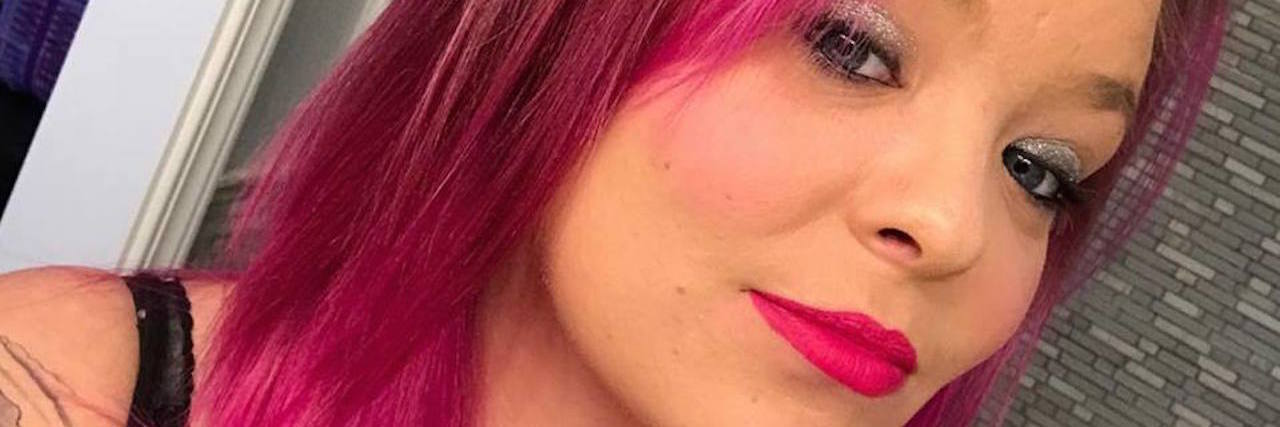Like many of us, Catelynn Baltierra knows what it’s like to have a mental health journey that’s less than straightforward. The “Teen Mom OG” star announced this week she’s being readmitted into a treatment center, just two and a half weeks after returning home from treatment, US Weekly reported. This is the third time she’s been in treatment for her mental health since November.
On Wednesday, Baltierra tweeted, “Well they say third times a charm… I’m going back to treatment people for 6 weeks to work on my trauma and getting on different meds.”
Well they say third times a charm… I’m going back to treatment people for 6 weeks to work on my trauma and getting on different meds. THANK YOU @TylerBaltierra I LOVE YOU SO MUCH!!!!! You are my light!! And nova you are my sunshine #KeepTalkingMH
— Catelynn Baltierra (@CatelynnLowell) January 17, 2018
Baltierra previously sought treatment for suicidal thoughts, and last year sought treatment for postpartum depression and anxiety after the birth of her second daughter. This week, Teen Mom OG shared a video on Twitter of Baltierra reflecting one year after her first time in treatment.
“This stuff is real, and it’s OK to be not OK,” she says in the video. “I’ve been home for treatment for over a year, and I’ve had multiple panic attacks, but they’re way more manageable. It’s OK to just admit you need help.”
“It’s ok to not be ok.” —@CatelynnLowell ❤️ Catch more OG strong moments every Monday on #TeenMomOG! pic.twitter.com/NHDg4AsFI8
— #TeenMomOG (@TeenMom) January 15, 2018
While some may think “mental health recovery” looks like seeking treatment, receiving a diagnosis, finding a treatment plan and getting released back into the world, “cured” — that couldn’t be further from the truth. Mental health stories are typically messy, and if Baltierra’s journey proves anything, it’s that mental health recovery isn’t linear — and that’s OK.
There are many reasons people seek out hospitalization or inpatient care. According to Mental Health America, hospitalization can help you get an accurate diagnosis, medications adjusted or stabilized or provide a safe space during an acute episode when your mental health has temporarily worsened.
Some questioned Baltierra’s decision to seek treatment again. One Twitter user even said, “I don’t put my family on the back burner because my childhood sucked.” Baltierra was quick to respond.
“For all u haters- YOU DONT KNOW EVERYTHING IVE BEEN THROUGH! Quit acting like you know what I should be doing or shouldnt!! I’m NOT running away from my family! Those are the people I love the most!!” she tweeted.
For all u haters- YOU DONT KNOW EVERYTHING IVE BEEN THROUGH! Quit acting like you know what I should be doing or shouldnt!! I’m NOT running away from my family! Those are the people I love the most!! ????????????you ppl are ignorant
— Catelynn Baltierra (@CatelynnLowell) January 18, 2018
While there’s no shame in how many times you enter a treatment center or a psychiatric hospital, it is crucial to know what to expect after you’re released. The Depression and Bipolar Support Alliance offers the following tips:
Know your treatment. Before you leave the hospital, make sure you have a written list of what medications to take, what dosage, and when to take them. Find out if there are any foods, medications (prescription, over-the-counter, or herbal) or activities you need to avoid while taking your medication, and write these things down. Track your medications and moods.
Learn all you can about your illness. Talk to your doctor about new treatments you might want to try. Find out what to expect from treatments and how you know if your treatment is working. If you think you could be doing better, ask another doctor for a second opinion.
Take one step at a time. You might not feel better immediately. Allow yourself to slowly, gradually get back to your routine. Give yourself credit for doing small things like getting out of bed, dressing or having a meal.
Prioritize the things you need to do and concentrate on one thing at a time. Write things down or ask friends and family to help you to keep from becoming overwhelmed.
Help your loved ones help you. Ask for what you need. Tell them specific things they can do to help you. If you need help such as housework, rides, or wake-up calls, ask.
Get support from people who have had similar experiences and are feeling better.
If you or someone you know needs help, visit our suicide prevention resources page.
If you need support right now, call the National Suicide Prevention Lifeline at 1-800-273-8255, the Trevor Project at 1-866-488-7386 or reach the Crisis Text Line by texting “START” to 741741.

